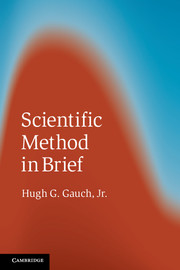Book contents
- Frontmatter
- Contents
- Foreword
- Preface
- 1 Introduction
- 2 Four bold claims
- 3 A brief history of truth
- 4 Science's contested rationality
- 5 Science's presuppositions
- 6 Science's powers and limits
- 7 Deductive logic
- 8 Probability
- 9 Inductive logic and statistics
- 10 Parsimony and efficiency
- 11 Case studies
- 12 Ethics and responsibilities
- 13 Science education
- 14 Conclusions
- References
- Index
Foreword
Published online by Cambridge University Press: 05 November 2012
- Frontmatter
- Contents
- Foreword
- Preface
- 1 Introduction
- 2 Four bold claims
- 3 A brief history of truth
- 4 Science's contested rationality
- 5 Science's presuppositions
- 6 Science's powers and limits
- 7 Deductive logic
- 8 Probability
- 9 Inductive logic and statistics
- 10 Parsimony and efficiency
- 11 Case studies
- 12 Ethics and responsibilities
- 13 Science education
- 14 Conclusions
- References
- Index
Summary
Approximately halfway through her Ph.D. program in the biological sciences, my first doctoral student requested that we meet to review progress toward the degree. Knowing that both the courses and research of this student were progressing nicely, I entered the appointment confident of a glowing report both for graduate student and major professor. However, the conversation took an unexpected twist as we finished discussing the items on my agenda.
When and how, the student asked, do we get to the more philosophical part of this Doctorate of Philosophy degree in science? Was it true that this program that I and the guidance committee had designed would not include even one course in science philosophy or no structured examination of the logical underpinnings of science? The final question had an unintended sting for me as major professor – something to the effect of “Will I graduate feeling worthy of more than a technical degree?”
Stunned and befuddled, I sent the student on her way with lame excuses: there simply wasn’t sufficient time in modern science training for students to become renaissance scholars and well-published researchers capable of competing successfully for grant dollars. Moreover, to venture into science philosophy required an unhealthy tolerance for time wasted in silly, perfectionistic arguments over whether or not the sun will rise tomorrow. The better path to becoming a successful scientist, I argued, was to function as an apprentice to successful researchers and get on generating data from real-world experiments. After all, I concluded, the quality of your Ph.D. program will be at least equal to my own. Had not my Ph.D. landed me a great postdoctoral experience at Cornell University and an enviable tenure-stream Assistant Professorship at Michigan State University?
- Type
- Chapter
- Information
- Scientific Method in Brief , pp. xi - xiiPublisher: Cambridge University PressPrint publication year: 2012



